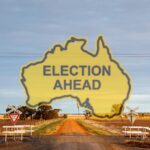The new government doesn’t need a committee to tell it what GPs need. It’s pretty simple.
Another election done and dusted. And we have a new prime minister and new political party taking their place on stage in Canberra.
No matter where your political allegiances lie, whether you feel pleased or disappointed by the result can hardly have been dependent on what is or was planned for general practice for the next few years.
While plenty of motherhood statements were bandied about – strengthen Medicare, improve GP access, support infrastructure and address shortages – the reality was that health (or more specifically primary care) wasn’t a high enough priority to have the nitty-gritty details of the different policies debated and discussed prior to the election.
Climate change, integrity in Canberra, and a general dissatisfaction with the previous incumbents were the key motivators for voters according to the majority of analysts.
So where does this leave us? Are we as GPs going to continue to go backwards financially, courtesy of barely budging Medicare rebates? Will the burgeoning bureaucracy that has become part and parcel of simply working as a GP be addressed? How are they going to increase access to GPs when fewer and fewer graduates want to train in the specialty?
We all get it. Healthcare is expensive. Medicare alone cost $27.5 billion in the 20-21 financial year, but only $8.8 billion of that went to GPs. So that’s almost a third of the Medicare expenditure, even though it included 170 million GP services.
The fact that Australia gets good value out of their GPs is not new. The argument that investing in primary care is like “a stitch in time saves nine” has been made many times. Again and again successive GP leaders have demanded, pleaded, explained and threatened whoever has been in government to pay attention to GPs and, at the very least, let rebate increases be linked to CPI increases.
To no avail. We continue to get screwed. Our greatest win to date was the lifting back in 2019 of the freeze that had kept Medicare rebates the same as they had been since 2014. Pathetic.
So is there any hope that our new government might look at our contribution to the healthcare system as something more than an opportunity to control, curtail and cut costs?
The pre-election promises aren’t all that promising. A “Strengthening Medicare Taskforce” chaired by the health minister (yes, just what we all need, another bloody taskforce), grants to help practice infrastructure such as IT, and I think, voluntary patient registration for the elderly (or that could have been Liberal policy – to be honest it was a bit hard to tell the difference).
But before plummeting into total despair, it could well be that circumstances will arise that will force the government to re-examine general practice, and hopefully pay more than lip service to supporting primary health – the “backbone of our healthcare system”.
Last month, the General Practitioner workforce report 2022 was published. Commissioned by Cornerstone Health and prepared by Deloitte Access Economics, the report was basically an analysis of GP supply and demand now and a forecast of what the situation was likely to be in the next 10 years.
“Demand for GP services is forecast to outpace supply – resulting in a widening shortfall of FTE GPs from 2022 onwards. This shortfall is expected to reach 11,392 GPs (FTE) – that is, 27.9% of the workforce – by 2032,” the report says.
What can the government do to fulfil its promise to improve access to primary care if the shortfall is this huge? They can bring in doctors from overseas as they’ve done for ages. They can train more of our own graduates in the specialty. Trouble is general practice is becoming less and less attractive as a career option.
Ultimately they’ve got to stop treating GPs like community service lackies, increase the rebate appropriately and automatically and treat the specialty with the respect it truly deserves.
How are you going to attract new recruits or overseas doctors to a specialty that our own government treats with such disdain?
I know I am ranting. And I know it’s not all about the money. General practice is a great profession, a great vocation and there are so many reasons why it should be appealing other than the remuneration – but the rebate thing is really appalling.
When I moved back to Sydney from the country just over 20 years ago I did some locum GP work at various practices around the city. I remember getting about $160-$170 an hour. There was even a practice down south that paid $200 an hour. Look at any locum recruitment site now in 2022 – the locum rate is exactly the same. Over 20 years later.
Every government I remember has wanted to make some sort of change to general practice, be it access to mental health support, chronic disease management, superclinics, divisions of general practice, nurse practitioners, practice accreditation etc. etc. It’s not all bad by any means, but somewhere along the line ensuring the GPs, who are pretty key to the service, are properly looked after has become a very low priority.
Who knows? Maybe, as the workforce report predicts, when demand for our services increases and the supply of GPs continues to dwindle, the government might feel some pressure to do something definitive. Maybe, as it becomes increasingly obvious that bulk billing is not sustainable financially, Albo will bite the bullet and simply bring rebates up to scratch.
It will cost, of course. But if the government could possibly sacrifice a few taskforces, reviews, inquiries, commissions, summits and committees, that might go some way to pay for it. And who knows – it might even help solve their imminent workforce issue. Time will tell.
Jeremy Knibbs is on leave





